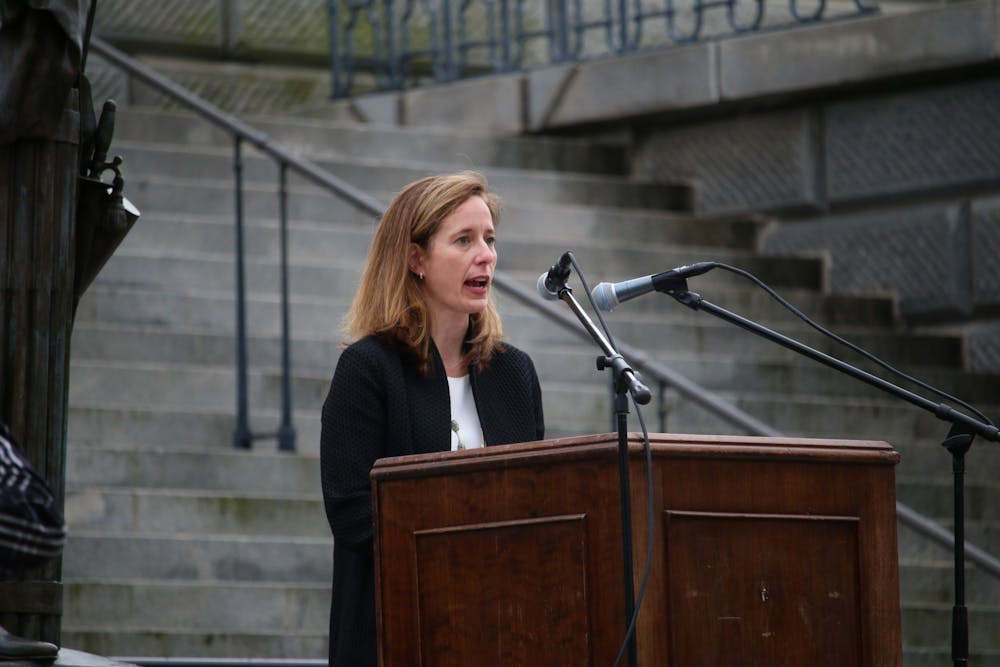Several organizations came together Tuesday to protest a bill moving through the South Carolina General Assembly that would not allow pregnant women to get an abortion if a fetal heartbeat is detected.
The bill, designated S. 1, also referred to as the "SC Fetal Heartbeat Protection from Abortion Act," was first introduced and read in the South Carolina Senate on Jan. 12, where it was then referred to the Senate Committee of Medical Affairs. The bill was ruled favorable by the committee on Monday and was debated on the Senate floor Tuesday.

In protest, a caravan of cars and other vehicles circled around the Statehouse, honking loudly in opposition.
Planned Parenthood, the American Civil Liberties Union and Women's Rights and Empowerment Network (WREN) collaborated to organize the protest.
Aside from the motorcade circling the building, opponents held a press conference on the Statehouse steps.
Dr. Kristl Tomlin, a Columbia-based OB-GYN, presented a letter from the South Carolina section of the American College of Obstetricians and Gynecologists. The letter featured signatures from 325 healthcare providers across South Carolina who oppose S. 1.
"I stand before you today on behalf of myself and over 300 other OB-GYNs and other healthcare professionals across the state to respectfully urge our legislature, and you to urge your legislature, to respectfully oppose the legislation of [S. 1]," Tomlin said.
Tomlin also said increasing restrictions to abortion presented physical danger for pregnant women.
"This state, our great state of South Carolina, has one of the highest rates of maternal mortality in the United States," Tomlin said. "Please, I urge the legislature to not stand between me and my patients. When a woman comes to me for help, she looks me in the eye, and she asks me for help. To pass this legislation hinders my ability to do that safely."
In the bill, exceptions are made for cases of rape, incest and medical emergency.
If passed, the bill would define a medical emergency as any condition “by any reasonable medical judgment” that “complicates the medical condition of a pregnant woman,” in which a lack of abortion or delay to detect a fetal heartbeat would cause “irreversible physical impairment of a major bodily function, not including psychological or emotional conditions.”
Vicki Ringer, director of public affairs for Planned Parenthood South Atlantic SC, objected to S. 1 being such a high priority for the General Assembly when the state is still dealing with the negative effects of the COVID-19 pandemic.
"As the number of this bill indicates S.1 it is their priority," Ringer said. "Six thousand, five hundred and fifty-two people in South Carolina have died from COVID. Has the Medical Affairs Committee or any of these senators done anything with COVID? No. Their first bill out of the gate has been an abortion ban," Ringer said.
Ann Warner, CEO of WREN, also urged the General Assembly to think twice before passing S. 1.
"We're asking our legislatures, please respect science, respect doctors, respect our Constitution and, above all, respect the capacity of the people of this state to make their own decisions about pregnancy and about parenting," Warner said.
USC law professor Jacqueline Fox said the bill was unconstitutional, so it couldn't be enforced even if passed.
"If it gets passed, and if the governor signed it, it would be unenforceable right now because it is unconstitutional," Fox said.
Fox said the bill was written with the acknowledgment that Roe v. Wade could potentially be overturned or dialed back by the Supreme Court in the future.
"If the court limits or overturns prior cases that protect people's rights to choose, then the states can step in and enact legislation up to whatever the Supreme Court allows," Fox said.
Kourtney Vermillion contributed to the reporting in this article.

